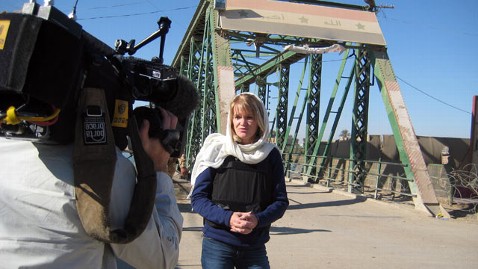Return to Iraq: Remembering 21 Trips as Americans Head Home
 Today was my 21st trip to Iraq. I arrived in bright sunshine on a comfortable commercial airliner from Amman, Jordan and even had a jetway to walk into the terminal.
Today was my 21st trip to Iraq. I arrived in bright sunshine on a comfortable commercial airliner from Amman, Jordan and even had a jetway to walk into the terminal.
My first flight here was far less elegant, making a dizzying landing in darkness aboard a military cargo plane. You will hear lots of comparisons in the coming days between Iraq of March of 2003 and today. And indeed, the change is dramatic. But that seems a somewhat absurd comparison to me. This war was defined by what happened in between. The war changed so dramatically from that march to "Camp Victory" to take over Saddam Hussein's palace, to the bloody relentless insurgency it would become.
It would not be long before Americans, and finally the White House, realized that something was going terribly wrong in Iraq. President Bush would then make the bold decision to add troops rather than bring them home. The so-called "surge" had begun."
But before, during and after the surge, so many lives were changed, or lost here, both Iraqis and Americans. In Fallujah today, I stood on the bridge where four American contractors were burned and left hanging for all to see. I could still see the bombing throughout the city where U.S. forces pounded that city in response.
On the airport road which was called "Route Irish," I remembered an officer telling me in the early days how insurgents had figured out how high the gunner was riding in our humvees and dangle the bombs from wires placed right at head level. He told me of one young man who was killed by that dangling bomb, losing his head in the process. I thought about him today. And I thought of the many terrifying rides I took up and down that road. I saw explosives experts blow up a fire extinguisher thrown on the road just in front of us that was packed with C4 explosives. I thought of Captain Vince Touhey, a Harvard graduate who had chosen the Army over Wall Street. He was assigned duty on Route Irish, and miraculously made it home alive. I stood in a combat support hospital in 2007 where injured Iraqis were lying next to U.S. soldiers with horrifying injuries. The American doctors were working just as hard to save the Iraqis as they were the Americans. A 19-year-old physician's assistant kept asking me that day about a two-year-old Iraqi girl who had been accidentally scalded by boiling milk. Her mother had run to the U.S. hospital in hopes the Americans could save her. I had to tell him, despite hours of tender care, I had watched her die. He could not speak, but walked off to treat someone else who was wounded. I wonder how a 19-year-old copes with all he saw in that hospital. I wonder how anyone copes with what they saw in Iraq? I know some of them don't.
Without question the most stunning part of today was to finally realize that the military is truly leaving. I did not see a single U.S. soldier. No convoys, no foot patrols. No one. All but a few bases of the more than 500 we once had are deserted. There was no one to call for a question or share a story. No one to call for help. The Iraqis are in charge now. And no one should fool themselves into believing that just because our troops are pulling out, that this war is entirely over.